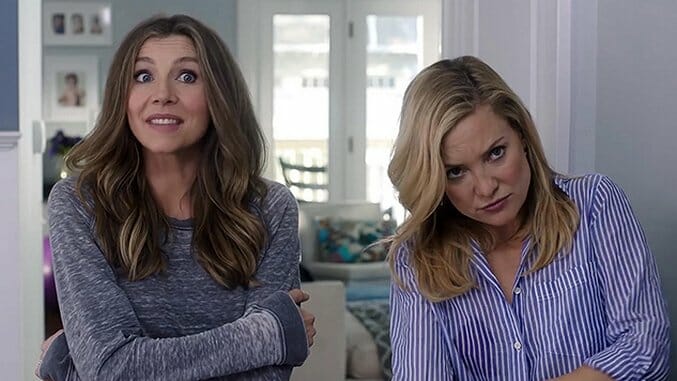Mother’s Day

From the beginning, Rob Marshall’s unlikely trilogy has felt more like a stampeding relative than an opportunity for a mushy family reunion. Seemingly compiled from a list of potential blackmail victims, Marshall’s cast lists have been both unusually stacked and completely catch-all, attempting to pander to any audience possible within an inch of its cinematic life. That’s the only way to explain a series that’s included dizzying coagulations like Robert De Niro and Alyssa Milano, or Taylor Swift and George Lopez.
Coming five years after the last installment, New Year’s Eve, Mother’s Day is another unwanted confection, but it’s less aggressively terrible than it is consistently misguided in its attempts to meld stories together of racism, loss, identity and the anxiety of having children who do what human beings do: grow up. In its worst moments, Mother’s Day feels like giving your mom a box of open, leftover Valentine’s Day chocolates—it’s stale, perfunctory and a gesture that’s entirely lost its meaning.
Made up of four separate but interlocking storylines, Mother’s Day can barely tangentially relate its pieces, lodging together four stories united by bad taste, pushy sentiments and a willingness to leave actual narrative progression to Mad Libs rather than to the creativity of its three credited screenwriters.
The most egregious by far, and the segment that will receive the most post-release condemnation, strands Kate Hudson, Sarah Chalke, Cameron Esposito, Aasif Mandvi and Margo Martindale in a more socially stunted context than Guess Who’s Coming To Dinner. As sisters who moved to Georgia from Texas, Gabi (Chalke) and Jesse (Hudson) have long kept their personal lives—their respective relationships with a woman and Indian man—secret from their parents to avoid their bigoted barbs. Introduced chomping on chicken wings and wearing hats that say things like “not my America,” their father (Robert Pine) is a blue-blooded red state zealot whose fashion sense is the only thing more dated than his ideas, while their mother (Martindale) is equally prone to saying things like your child is too dark, and questioning basic biological impulses.
Mother’s Day’s identity politics involving anyone who’s not a straight WASP are the nuanced equivalent of “I have a gay/black/Indian friend,” allowing both a parade of stomach churning gags and a “genuine” interest in resolving those deep-seated issues with a bow and a belly laugh. What qualifies as a joke in Mother’s Day are characters yelling cliches or racist things at each other.
-

-

-

-

-

-

-

-

-

-

-

-

-

-

-

-

-

-

-

-

-

-

-

-

-

-

-

-

-

-

-

-

-

-

-

-

-

-

-

-








































